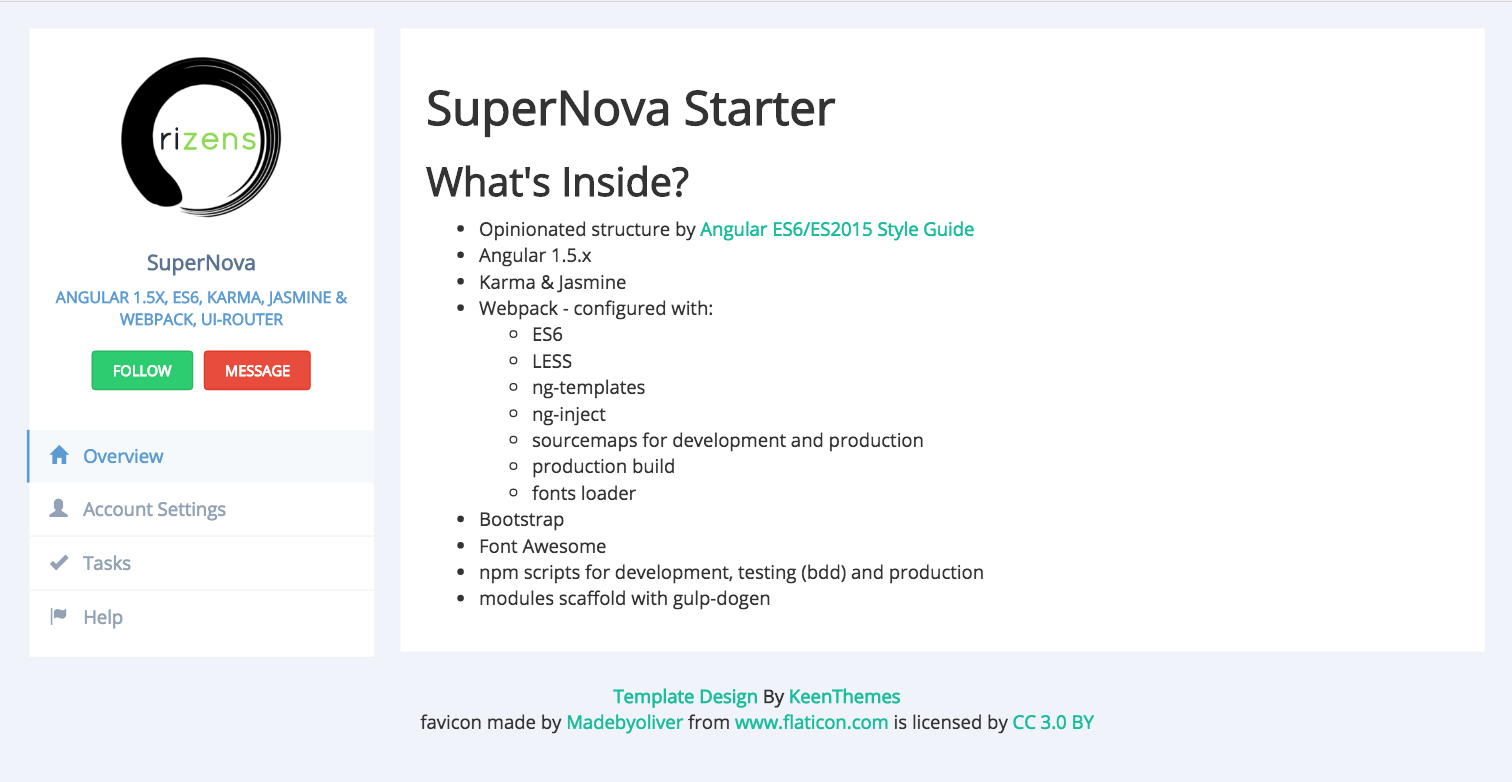![]()
An opinionated boilerplate by Angular ES6/ES2015 Style Guide by orizens:
- Angular 1.5.x
- ui-router 1.x (component support)
- Karma & Jasmine
- Webpack - configured with:
- ES6
- LESS
- ng-templates
- ng-inject
- sourcemaps for development and production
- production build
- fonts loader
- bootstrap
- font-awesome
- npm scripts for development, testing (bdd) and production
- modules scaffold with gulp-dogen
- FULLSTACK: json-server for mocking backend api during development - available in fullstack branch
- nodejs >= 5, npm > 3
- clone this repo
# clone repo
# --depth 1 removes all but one .git commit history
git clone --depth 1 https://github.com/orizens/supernova-angular-1.5.x-es6-starter.git
# change directory to our repo
cd supernova-angular-1.5.x-es6-starter
# install dependencies with npm
npm install
# start dev server
npm start
navigate to http://localhost:9001 in your browser for the front end
in the fullstack branch, the npm start command also starts the json-server process.
navigate to http://localhost:3000 in your browser to view the available routes in the local server api which is served from tests/mocks/db.json.
For more info: json-server documentation
supernova-angular-1.5.x-es6-starter/
├──config/ * our configuration
| ├──config/ * saved for e2e and remote e2e testing
| ├──dist-assets/ * static files for production - these are copied to dist after with prod task
| ├──templates/ * gulp-dogen modules templates for scaffolding modules
| ├──deploy.sh * script used to deploy dist to github:gh-pages branch with TravisCI
│ ├──dogen.js * gulp task to configure templates for scaffolding
│ ├──e2e-test.js * saved for configuring e2e test runner
│ └──server.js * gulp helper task to run server for dist
│
├──src/ * source files of the whole app
| ├──app.js * entry file for the app
│ │
| ├──index.html * main index page (app.js and vendors.js are added automatically )
│ │
│ ├──components/ * all SMART components should be created here
│ │ ├──home/ * an example for a smart component: includes less
│ │
│ └──core/ * core layer of the app
│ │ ├──components/ * all dumb components should be created here
│ │ ├──services/ * all services of the app should be created here so SMART components can import it
│ │ ├──css/ * app wide less styles
│ │ ├──config/ * config phase for each environment
│ │
├──tests/ * currently saved for mock files and e2e tests
│
├──.eslintrc.json * eslint config
├──package.json * what npm uses to manage it's dependencies
└──specs.bundle.js * used by karma to collect spec files to run tests
└──webpack.config.js * webpack configuration file for development
└──webpack.config.production.js * webpack configuration file for production
this package uses gulp-dogen for scaffolding. There are 2 templates in config/templates:
- ngmodule
- ngservice
to scaffold, run in terminal:
# to scaffold new ng component in src/components
npm run dogen -- --ngmodule the-name-of-module
# to scaffold new ng service in src/core/services
npm run dogen -- --ngservice the-name-of-servicethe build creates 2 bundled files:
- app.bundle.js - includes the files created by you
- vendors.bundle.js - includes the files created by the list configured in webpack.config.js. Simply add the npm package name to the list of vendors.
to run tests while developing use:
npm run bdd
to run tests once use:
npm test
running unit tests in debug mode - npm run testd
A production build is configured by webpack.config.production.js.
to create a build, simply run:
npm run prod
This creates a dist directory with a minified and bundled version of the app.
You can run a local server to check the dist build by npm run prod:serve. It is based on lite-server and can be extended through config/prod-config.json by the various options available to it.
testing for all files - Currently testing only core directory- protractor / e2e
- browserstack configuration / remote e2e
- ngMaterial
component routerno version for ng1 yet- rxjs (?) - still uses $scope to create observables
- ngRedux
To request a feature - please open an issue. Better than this, open a PR with your proposed update.
Thanks.

